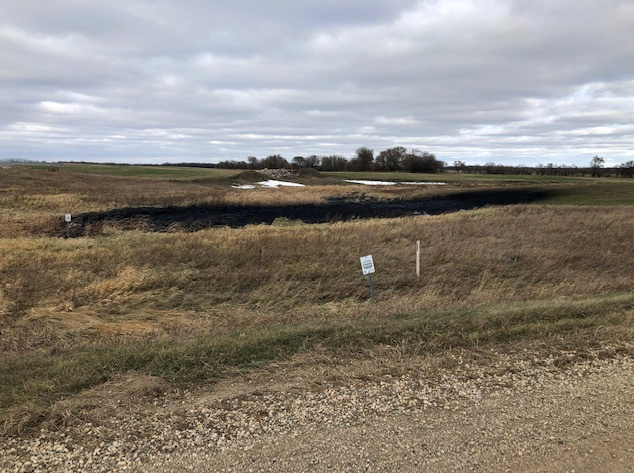On Thursday, an estimated 9,120 barrels of oil spilled from TC Energy Corp.’s Keystone’s crude pipeline near Edinburgh, North Dakota.

Early estimates suggest 1.4 million litres of oil have spilled, affecting 2,090 square meters of land.
TC Energy has not yet disclosed the cause of the rupture, saying only that on Wednesday, the 93.8 million litre-per-day pipeline system to the United States would be shut off, after officials detected a drop in pressure.

The company said there were no injuries and that it was investigating the cause of the breach.
The pipeline has been shut down since the leak.
In addition to raising environmental concerns, the spill has prompted questions of how, and if, it will affect the Canadian oil industry. Will oil prices be impacted and will Canadians notice an increase in gas prices as the pump?
Here’s what experts say:
Patrick DeHaan, head of patroleum analysis at GasBuddy, says while the amount of oil lost is a “drop in the bucket” compared to how much oil the pipeline transports, from a spill perspective, the incident is “pretty significant,” and the implications are “fairly notable.”
Crude oil began flowing through the pipeline in 2010. It is part of a 4,324-kilometre system that is also to include the proposed $8 billion Keystone XL pipeline, designed to transport the oil from western Canada to terminals on the Gulf Coast.
“The fact that the pipeline has shut down now as a result of this spill, it sounds like there may be downtime of several days, if not longer, where this possibly affected portion of this pipeline where this breach occurred,” DeHaan said.

Get daily National news
“And certainly since this pipeline carries Canadian crude oil down into the Unites States to refineries in the Midwest, this could start to lead to a small backup in oil supply in Canada and that could negatively affect the price of Canadian oil.”
TC Energy has not said when pipeline operations would restart, but told shippers that service to U.S. Midwest refiners would remain shut during the outage. The line could remain shut for at least a week, according market sources told Reuters on Thursday.
DeHaan says the longer the pipeline is shut, the larger the problem could become.
“I would say in a matter of over five days, seven days it would start to become significant, so it would happen in fairly short order,” he said.
“And a pipeline breach of this magnitude — that calls into question the line’s integrity, so it may take longer than that.
“So I think we’re right on the cusp of having a larger backup problem in Canada at this point.”

According to Roger McKnight, chief petroleum analyst with En-Pro International Inc., there is a high demand currently for Canadian crude oil, especially by refiners on the Gulf Coast and in the Midwest, because of the low cost.
He said there is a high demand for what is called distillates including jet fuel, heating oil and diesel fuel as we head into the winter months.
He says refiners are “trying to crank up the refineries to get ready for winter,” increasing the demand for this type of crude oil.
“Any interruption in the flow of crude to the refineries and in the in the Gulf Coast or in the Midwest does create some concerns as far as prices are concerned,” he said. “But U.S. inventories of crude are really very, very healthy right now.
“So it depends how long it takes for them to fix this and how the stock market really reacts to this news.”
He says if traders looking at the futures market think this will be a major supply disruption, then it may cause a small spike in the price of crude, gasoline and diesel.
However, he says the pipeline would need to remain shut for longer than two weeks for there to be a large impact.
McKnight says he doesn’t think that will happen because officials will want to clean the spill and repair the pipeline as quickly as possible “because it’s in their best interest” to do so.
“I can’t see this lasting. This isn’t a major, major earth-shattering spill or leak,” he said. “It’s a minor one in terms of spill levels.”
Will gas prices be affected?
According to DeHaan, as of right now, the spill will likely only have “negligible” impact on gas prices in the Great Lakes area in the U.S. He says that is because the majority of the oil flowing through the Keystone pipeline does not end up back in Canada.
“But even then, until this pipeline is down for a period of time, that would amount to over a week. I wouldn’t say there would be widespread implications as a result of its shutdown,” he said.
“But after that, there would likely be more of a pricing impact in the U.S. simply because the breach in the pipeline severed the connection from Canadian oil fields to U.S. refineries.”
DeHaan says it’s likely the spill won’t have any impact, or will have “very limited impact” on gas prices in Canada.
“I wouldn’t expect that most motorists would feel really any impact from this,” he said.
He added, however, that some portions of Western Ontario, including Sarnia, could see a “very small” impact because refiners in the Great Lakes serve those areas.
However, he says if the pipeline remains shut for an extended period of time, Canadians may start to see “slight impacts” at the pump.

McKnight, too, says the spill likely won’t have any major affects on gas prices.
“Matter of fact, I’m calling for prices to actually fall west of Thunder Bay over the short term,” he said, “because the Midwest refinery, they’re up to 90 percent capacity, which is a six percent increase over last week.”
— With files from Reuters and The Associated Press









Comments
Want to discuss? Please read our Commenting Policy first.